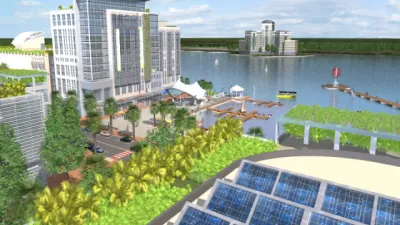Richard Register argues that we can do much more to redesign cities and city functions to reduce energy consumption, primarily by ceasing to plan for automobiles.
"The concepts behind the ecocity are fairly simple...[but] a major difficulty in moving toward ecocities is that cars have influenced urban design for 100 years. Many of us caught in this infrastructure find it extremely difficult to get around in anything but the car. The distances are just too great for bicycles, the densities just too low to allow efficient, affordable transit.
It's possible to build ecocities, and we must do so if we are ever to solve the looming triple crisis of climate change, declining biodiversity, and dwindling fossil fuel energy.
Cities are 'whole systems' and function something like living organisms. Their main organs are linked together, complementing each other's services for the benefit of the whole and relating the whole to its environment in a way that could be of reciprocal benefit to all organs and the whole organism. The city's organs include structures for transportation, living, working, education, shopping, recreation, manufacturing, and distribution.
The whole organism of the city we've been constructing for the last 150 years has been built on the basis of linking functions through ever-lengthening strands of connection.
[Eco-cities] are the wave of the future - if we are smart enough to get to that future in one piece."
FULL STORY: Cities Can Save the Earth

Planetizen Federal Action Tracker
A weekly monitor of how Trump’s orders and actions are impacting planners and planning in America.

Restaurant Patios Were a Pandemic Win — Why Were They so Hard to Keep?
Social distancing requirements and changes in travel patterns prompted cities to pilot new uses for street and sidewalk space. Then it got complicated.

Map: Where Senate Republicans Want to Sell Your Public Lands
For public land advocates, the Senate Republicans’ proposal to sell millions of acres of public land in the West is “the biggest fight of their careers.”

Orange County, Florida Adopts Largest US “Sprawl Repair” Code
The ‘Orange Code’ seeks to rectify decades of sprawl-inducing, car-oriented development.

Maui's Vacation Rental Debate Turns Ugly
Verbal attacks, misinformation campaigns and fistfights plague a high-stakes debate to convert thousands of vacation rentals into long-term housing.

San Francisco Suspends Traffic Calming Amidst Record Deaths
Citing “a challenging fiscal landscape,” the city will cease the program on the heels of 42 traffic deaths, including 24 pedestrians.
Urban Design for Planners 1: Software Tools
This six-course series explores essential urban design concepts using open source software and equips planners with the tools they need to participate fully in the urban design process.
Planning for Universal Design
Learn the tools for implementing Universal Design in planning regulations.
Heyer Gruel & Associates PA
JM Goldson LLC
Custer County Colorado
City of Camden Redevelopment Agency
City of Astoria
Transportation Research & Education Center (TREC) at Portland State University
Camden Redevelopment Agency
City of Claremont
Municipality of Princeton (NJ)



























